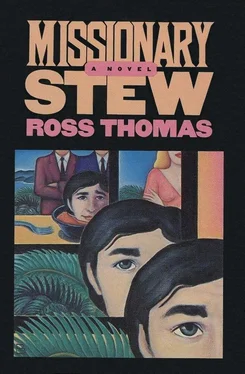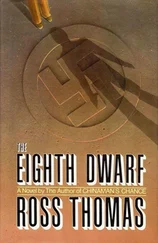Ross Thomas - Missionary Stew
Здесь есть возможность читать онлайн «Ross Thomas - Missionary Stew» весь текст электронной книги совершенно бесплатно (целиком полную версию без сокращений). В некоторых случаях можно слушать аудио, скачать через торрент в формате fb2 и присутствует краткое содержание. Город: New York, Год выпуска: 1983, ISBN: 1983, Издательство: Simon & Schuster, Жанр: Политический детектив, на английском языке. Описание произведения, (предисловие) а так же отзывы посетителей доступны на портале библиотеки ЛибКат.
- Название:Missionary Stew
- Автор:
- Издательство:Simon & Schuster
- Жанр:
- Год:1983
- Город:New York
- ISBN:978-0-671-49363-9
- Рейтинг книги:3 / 5. Голосов: 1
-
Избранное:Добавить в избранное
- Отзывы:
-
Ваша оценка:
- 60
- 1
- 2
- 3
- 4
- 5
Missionary Stew: краткое содержание, описание и аннотация
Предлагаем к чтению аннотацию, описание, краткое содержание или предисловие (зависит от того, что написал сам автор книги «Missionary Stew»). Если вы не нашли необходимую информацию о книге — напишите в комментариях, мы постараемся отыскать её.
Missionary Stew — читать онлайн бесплатно полную книгу (весь текст) целиком
Ниже представлен текст книги, разбитый по страницам. Система сохранения места последней прочитанной страницы, позволяет с удобством читать онлайн бесплатно книгу «Missionary Stew», без необходимости каждый раз заново искать на чём Вы остановились. Поставьте закладку, и сможете в любой момент перейти на страницу, на которой закончили чтение.
Интервал:
Закладка:
Haere was first. “The Chicago Daily News . A long time ago.”
“Not so long,” Veatch said. “Eleven years. Ten maybe.”
“How old is he now — fifty?” Haere asked.
Louise Veatch shook her head. “Craigie says forty or so — if that.”
“I thought he was older,” Haere said.
Baldwin Veatch looked up at the ceiling, his expression thoughtful. “There was something,” he said slowly, “something about a Pulitzer, wasn’t there?”
“He was nominated,” Louise Veatch said, “and everyone thought he was going to get it, but then they changed their minds, or something like that.”
“Why?” Veatch said.
“I don’t remember.”
“I remember his stuff, though,” Haere said. “There was this one long piece he wrote for The New Yorker about Togo and Dahomey — about four or five years back. Very sad, funny stuff.”
“That’s not quite what I had in mind,” Veatch said.
“Wait a minute,” Louise Veatch said. “I recollect now. About the Pulitzer. He was in Vietnam. It was a series he did on corruption. They threw him out of the country.”
“You’re right,” Haere said. “So where is he now?”
“You know Craigie’s place down on the PCH in Malibu?”
Haere shook his head.
“Well, that’s where he is. He’s Craigie’s new super.”
“Jesus,” Veatch said.
They kept the governor-elect out of the approach to Morgan Citron. They kept him out for the usual reasons: so that he could deny he knew anything about it, so that he could attend yet another breakfast meeting with his transition team at the Beverly-Wilshire, and so that Haere and Louise Veatch could steal an hour to thresh around in bed together. Veatch at first was not at all sure he wanted his wife in on the approach to Morgan Citron until she crisply reminded him of her admittedly uncanny ability to spot hidden defects of character, faith, and morals.
“Remember that banker up in Redding — the one you were going to make chairman of your campaign finance committee?”
Veatch nodded glumly. “The child molester.”
“Well, who spotted him right off?”
Veatch sighed. “Okay. Go ahead. You and Draper size him up and if he looks good, hire him.” He turned to Haere. “But he’ll be working for you — not me. Understand?”
“Perfectly,” Haere said.
Morgan Citron was slicing some carrots into his new batch of pot au feu when they knocked on the door of Unit A. Still carrying the knife and the carrot, he crossed to the door and opened it. Louise Veatch stood there, smiling. Draper Haere was just behind her.
“Mr. Citron?” she said.
Citron nodded. “Somehow,” he said, “I don’t think you two are the Jehovah’s Witness folks.”
“My name’s Mrs. Veatch,” she said, extending her hand. “Mrs. Baldwin Veatch.”
“I know,” Citron said, accepting her hand.
“And this is my friend and associate, Mr. Haere.”
Citron looked at Haere, who moved his still-bandaged right hand in a small apologetic gesture.
“Draper Haere, right?” Citron said. “The money man.”
Despite himself, Haere was pleased by the recognition. He smiled and said, “We were wondering if we might talk to you.”
“All right,” Citron said. “Come in.”
Louise Veatch and Haere entered the apartment and looked around. What they saw made them keep their expressions carefully neutral. Citron smiled. “Not exactly your basic Malibu sybaritism.”
“Not exactly,” Louise Veatch said.
“Sit down,” Citron said, waving them to the Formica table and its molded plastic chairs. “Coffee?”
“If it’s no bother,” Haere said.
“It’s instant,” Citron said and moved to the Pullman kitchen’s small stove, where a pot of water was boiling. He spooned instant coffee into three mismatched mugs and poured the water. “I’ve got sugar, but no cream.”
Louise Veatch said she drank hers black; Haere asked for sugar. Citron served the coffee, sat down at the table, leaned back in his chair, smiled slightly, and waited for the pitch to begin.
“Craigie Grey told me you were looking after her place,” Louise Veatch said. “Have you known Craigie long?”
“Not long.”
“Craigie’s — well, Craigie’s unique.”
“She seems to be.”
Haere took up the indirect interrogation. “You were in Africa not too long ago.”
“It’s been a little more than a year now.”
Haere nodded as if grateful for being corrected on some minor point. “I remember reading about it — when you got back to Paris. It was a wire-service story, I think. AP.”
“They all moved it,” Citron said. “AP, UPI, Reuters. And then it died. Thank God.”
“You never wrote anything about it yourself though, did you?” Louise Veatch said. She looked around the room again. “This looks as if it would be a good place to write. Maybe even a book.”
“I’m not writing a book, Mrs. Veatch.”
Haere nodded, this time sympathetically. “It must’ve been a lousy experience — being in jail there, I mean.”
“Yes,” Citron said. “It was.”
“My father was a newspaperman,” Haere said, wondering why he even mentioned it. He then uncharacteristically tacked on yet another autobiographical note. “Down South. In Birmingham.”
Citron smiled pleasantly.
It was Louise Veatch who asked the question Citron had been anticipating. “Was he — well, was he really a cannibal?”
Citron shrugged. “That’s what a lot of people say, anyway.”
Louise Veatch leaned back in her chair. She looked at Citron and smiled slightly. Haere took it to be her stamp of approval and decided to get to the point. “You don’t have anything scheduled right now, then?”
“No,” Citron said. “Nothing much.”
“Would you be interested in taking something on?”
“It depends.”
“Of course. But what I mean is, are you free to take on something?”
“I’m free.”
Louise Veatch leaned her elbows on the table and dropped her voice down into a lower register. It made her tone throaty and confidential. It sounded to Citron something like a born conspirator’s voice. “A friend of ours got killed up in the Colorado mountains just outside of Denver yesterday.” She paused and looked at Haere. “Was it just yesterday?”
Haere nodded.
“We think he was murdered.”
“Well,” Citron said because she seemed to expect him to say something.
“His name was Replogle. Jack Replogle.”
“Replogle Construction?” Citron said.
Haere looked surprised. “You knew him?”
Citron shook his head. “I used to see his signs in some of the countries I moved around in.”
“The hot countries.”
“Right,” Citron said. “The hot countries.”
Louise Veatch looked at Haere. “Tell him what happened, Draper.”
Haere again repeated everything Jack Replogle had told him about Singapore and Drew Meade and how Meade, according to the two FBI agents, had gone missing. Citron listened, made no notes, but asked Haere to repeat the names of the FBI agents. When Haere had finished, there was a silence, which was broken when Citron shoved his chair back, rose, and moved to the stove, where he picked up the knife and resumed slicing the remainder of the carrot into the pot au feu .
“Smells good,” Haere said. “What is it?”
“Stew,” Citron said, put down the knife, turned, and leaned against the sink, his arms folded across his chest as he examined the attractive, well-dressed woman and the man with the despairing face. Citron sensed that they were more than mere political colleagues. They spend a lot of time in bed together, he told himself, and was mildly surprised to find that he approved of the notion. It had been two years at least since Citron had last approved or disapproved of anything.
Читать дальшеИнтервал:
Закладка:
Похожие книги на «Missionary Stew»
Представляем Вашему вниманию похожие книги на «Missionary Stew» списком для выбора. Мы отобрали схожую по названию и смыслу литературу в надежде предоставить читателям больше вариантов отыскать новые, интересные, ещё непрочитанные произведения.
Обсуждение, отзывы о книге «Missionary Stew» и просто собственные мнения читателей. Оставьте ваши комментарии, напишите, что Вы думаете о произведении, его смысле или главных героях. Укажите что конкретно понравилось, а что нет, и почему Вы так считаете.












